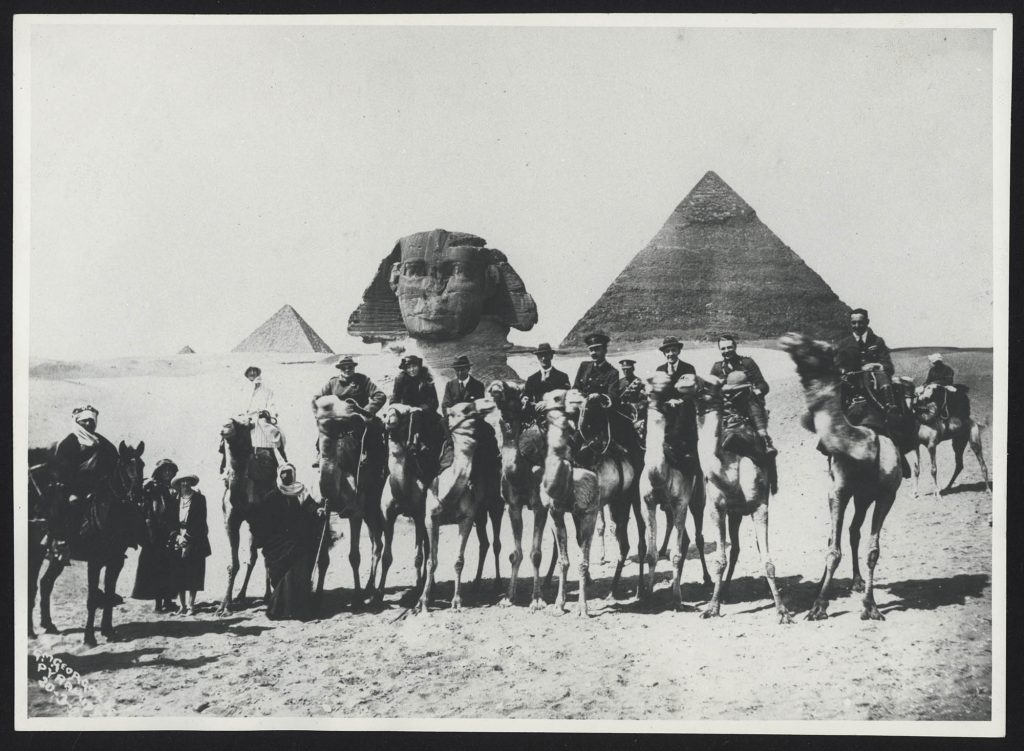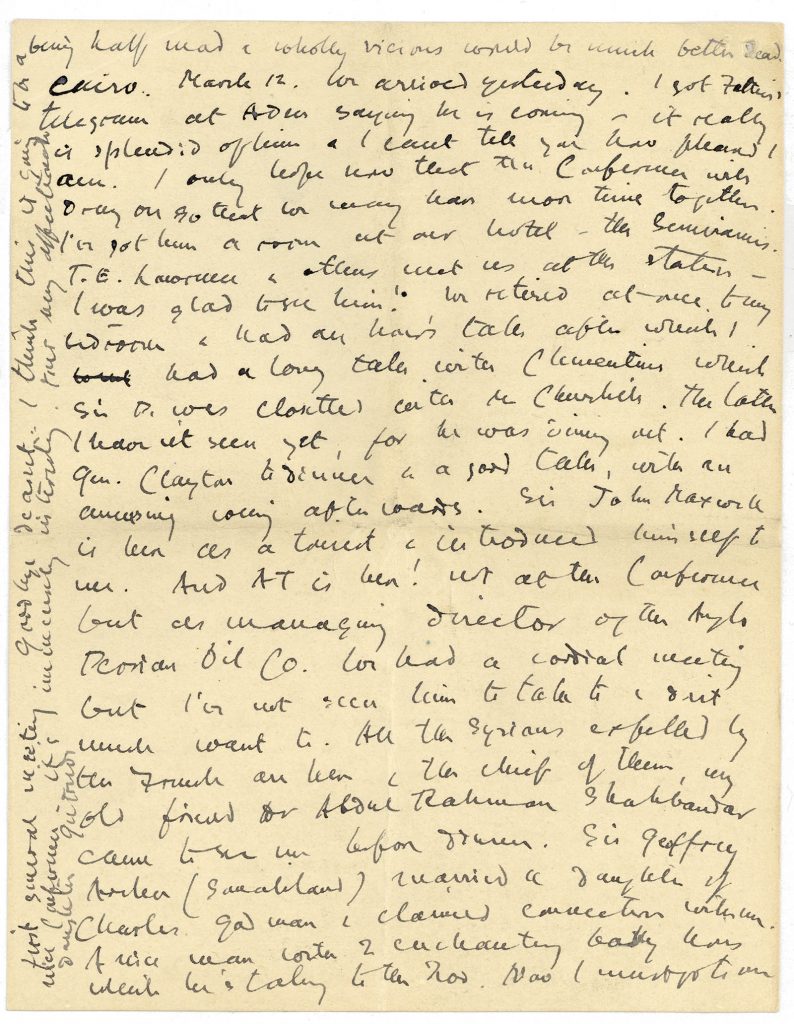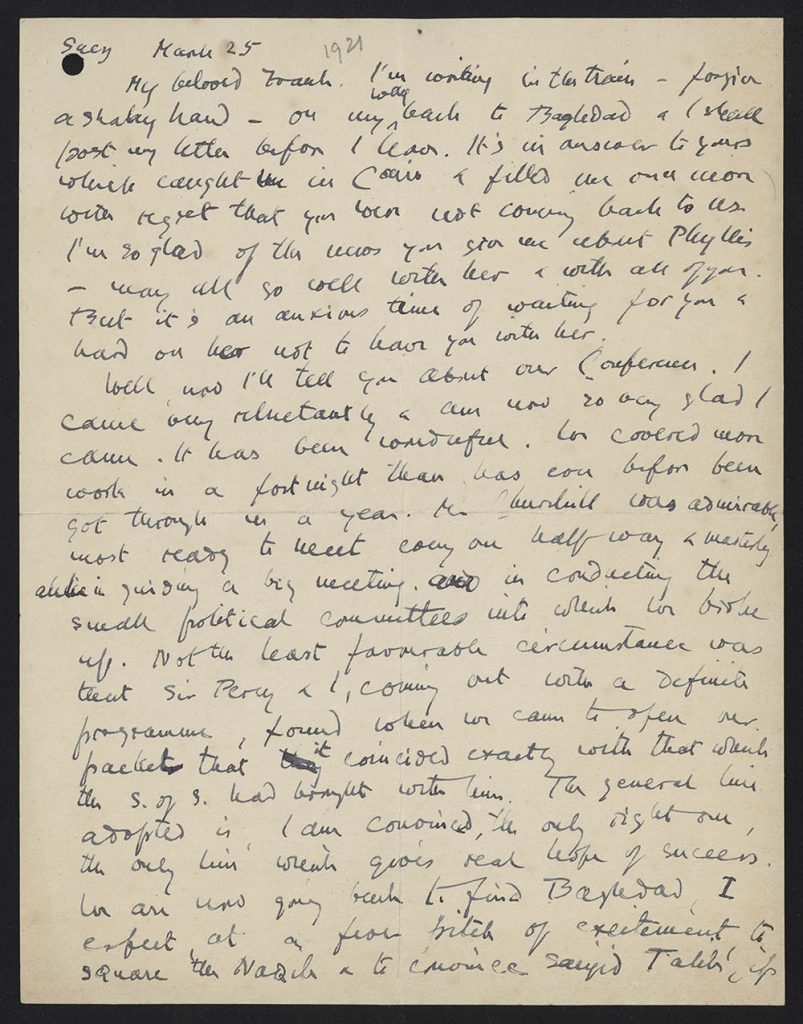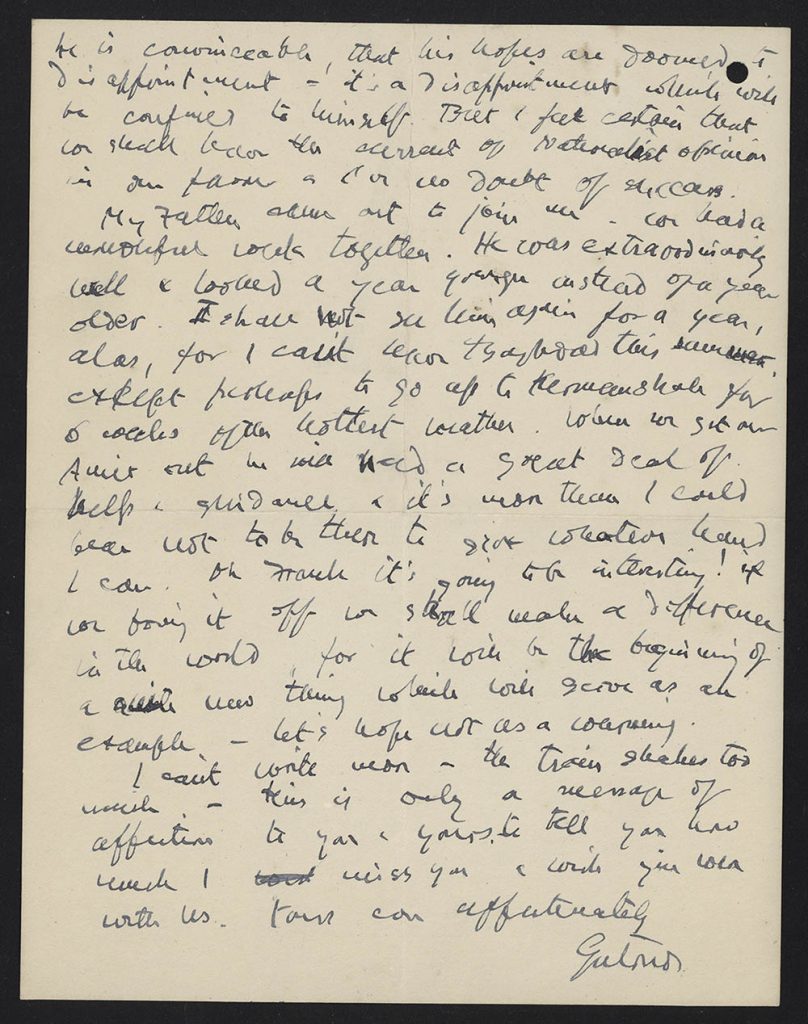March 1921 marked a key milestone in the history of the Middle East and Iraq, and one in which Gertrude Bell played an important role. The key event was the Cairo Conference, where British officials met to discuss the political situation and agree on the future political makeup of the region.

The conference took place between the 12th and 30th of March in Cairo, Egypt. Key attendees included (Sir) Winston Churchill (at the time Secretary of State for the Colonies), T.E. Lawrence (Special Advisor to the Colonial Office), Sir Percy Cox (High Commissioner of Iraq) and Gertrude Bell herself who had previously been appointed as Oriental Secretary for the High Commissioner of Iraq. Gertrude Bell already had a working relationship with Percy Cox dating back several years to their time spent together in Basra and Baghdad during the First World War where she worked under him using knowledge gained over the preceding years of the local tribal populations and their politics to advise the British leadership.
We know a great deal of Gertrude’s thoughts, opinions and involvement in the conference and middle eastern politics thanks to the letters she wrote throughout her life to family members which were retained, and then passed to Newcastle University after her death in 1926. The university also holds several thousand photographs and diaries chronicling her time travelling and working overseas, often in a great deal of detail.
Gertrude’s letter of the 12th of March 1921 includes detail of her arrival in Cairo and the Semiramis hotel, and her first evening spent reacquainting with some of the other attendees at the conference:
T.E. Lawrence and others met us at the station – I was glad to see him! We retired at once to my bedroom and had an hour’s talk after which I had a long talk with Clementine while Sir P. [Sir Percy Cox] was closetted [sic] with Mr Churchill. The latter I haven’t seen yet, for he was dining out. I had Gen. Clayton to dinner and a good talk, with an amusing evening afterwards.

Busy with conference proceedings, and a visit from her father who had travelled to Cairo to see Gertrude, her next letters were written after the end of the conference whilst travelling back to Baghdad. In a letter to Lieutenant Colonel Frank Balfour Gertrude writes of the conference:
Mr Churchill was admirable, most ready to meet everyone half way and masterly alike in guiding a big meeting and in conducting the small political committees into which we broke up. Not the least favourable circumstance was that Sir Percy and I, coming out with a definite programme, found when we came to open our packets that it coincided exactly with that which the S. of S. had brought with him. The general line adopted is, I am convinced, the only right one, the only line which gives real hope of success. We are now going back to find Baghdad, I expect, at a fever pitch of excitement, to square the Naqib and to convince Saiyid Talib, if he is convinceable, that his hopes are doomed to disappointment – it’s a disappointment which will be confined to himself. But I feel certain that we shall have the current of Nationalist opinion in our favour and I’ve no doubt of success.


As Gertrude suggests in her letter written on the 25th of March, the plan that was agreed for the future of Middle East and in particular the formation of the country of Iraq aligned closely with her own vision and ideas including the appointment of Faisal I bin Hussein bin Ali al-Hashemi as the first king of Iraq. Indeed a month later on the 17th of April, when back in Baghdad, Gertrude wrote to her father saying “I’m happy in helping to forward what I profoundly Bellieve [sic] to be the best thing for this country and the wish of the best of its people”. In the same letter she also described her role in the arrest and subsequent exile of Talib al-Naqib who had objected to the British plan for Iraq and threatened a rebellion.
While the extent to which her input influenced the eventual solution can be debated, that the solution she advocated closely reflected the outcome of the conference is reflected in her writing from the time of the conference and the preceding months and years.
Gertrude Bell achieved much as a woman in the early 20th Century, including exploits in mountaineering, travelling and recording middle eastern culture and archaeology, enabled greatly by her privileged upbringing which allowed her the time, finances and social connections to develop her interests. Despite her many remarkable achievements in spheres dominated by men, she was also a prominent anti-suffrage campaigner. This aspect of Gertrude Bell’s life has been explored through an online exhibition curated by a student studying an English Literature ‘Exhibiting Texts’ module and can be found here.
Transcripts of Gertrude Bell’s letters and diaries, and the digitised versions of Gertrude Bell’s collection of photographs can be found on our dedicated Gertrude Bell website by clicking here.
Other blog posts focussing Gertrude Bell and her archive include a post featuring a letter written in 1920 including her thoughts on the Middle Eastern political situation at the time, found here, and a longer post exploring Gertrude’s involvement in the the First World War, found here.
